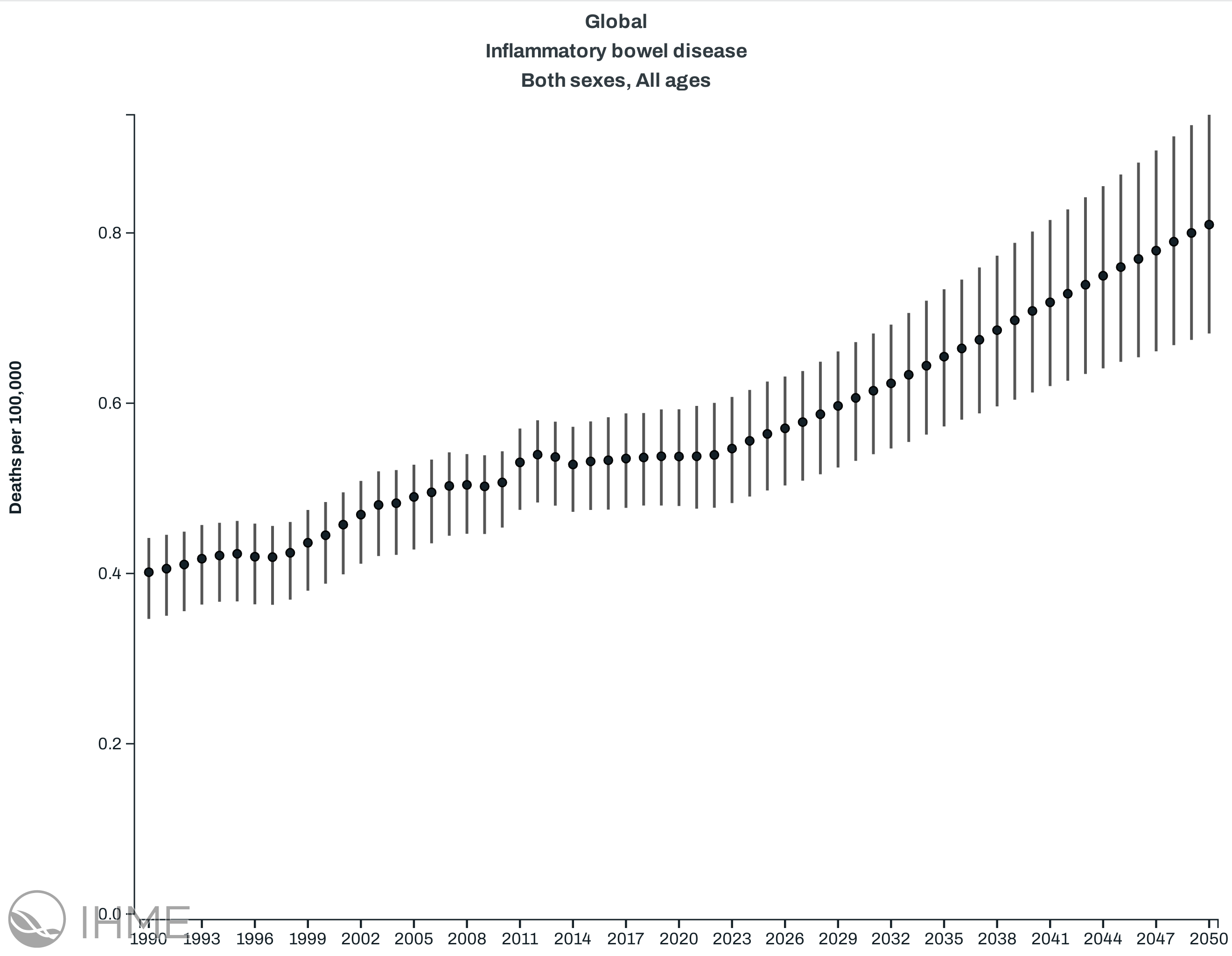Monday Poster Session
Category: IBD
P3172 - Global Trends and Disparities in Inflammatory Bowel Disease-Related Mortality: A Systematic Review of the Past Two Decades
Monday, October 27, 2025
10:30 AM - 4:00 PM PDT
Location: Exhibit Hall

Karan Bhatia, OMS II, MAS (he/him/his)
University of New England College of Osteopathic Medicine
Portland, ME
Presenting Author(s)
Karan Bhatia, OMS II, MAS1, Muhammad Hassan, MD2, Imaan Mehmood, BS3, Zach Trichas, MS4, George Chamoun, BA5, Bhavik Patel, DO, MS6, Gurbeen Dadiala, BS7, Ashwathy Cini, BS8
1University of New England College of Osteopathic Medicine, Portland, ME; 2Nuvance Health, Poughkeepsie, NY; 3University of Toronto, Toronto, ON, Canada; 4Rutgers New Jersey Medical School, Newark, NJ; 5University of North Texas Health Science Center, Fort Worth, TX; 6Ochsner Clinic Foundation, New Orleans, LA; 7Midwestern University, Glendale, AZ; 8Touro University Nevada, Henderson, NV
Introduction: Inflammatory bowel disease (IBD) is a chronic disorder of the gastrointestinal tract that includes Crohn's Disease (CD) and Ulcerative Colitis (UC), which has traditionally been considered a chronic but non-fatal condition. However, emerging data suggest a shifting landscape in IBD-related mortality, with potential increases in burden driven by demographic, socioeconomic, and geographic disparities. This systematic review evaluates global IBD mortality trends from 2004 to 2024, with a focus on regional patterns and inequities related to sex, race, socioeconomic status, healthcare access, and treatment.
Methods: A systematic literature search was conducted across PubMed, Scopus, and Web of Science using standardized PRISMA guidelines. From 1,200 initial records, 38 studies met inclusion criteria, providing quantitative mortality outcomes and demographic or geographic stratifications. Data were synthesized thematically, supplemented by estimates from the Global Burden of Disease (GBD) 2017 and 2019 studies.
Results: Global age-standardized IBD mortality rates declined modestly from 0.56 to 0.54 deaths per 100,000 between 2017–2019, alongside a slight decrease in prevalence. However, regional disparities were striking: mortality increased in Central and Eastern Europe, Central Asia, and Latin America, while prevalence simultaneously declined. In contrast, high-income regions exhibited stable or reduced mortality despite rising incidence. Disparities by gender, socioeconomic status, and race were also notable. Males and individuals of lower socioeconomic status had higher mortality risks, likely due to reduced access to advanced treatments. Racial minorities in the U.S. demonstrated poorer outcomes and lower biologic utilization. Forecasts from GBD 2021 predict a reversal of mortality declines, with rates projected to rise to 0.81 per 100,000 by 2050.
Discussion: Despite modest global progress, IBD-related mortality is increasingly shaped by structural inequities. The uneven uptake of biologics and small-molecule therapies, compounded by insurance restrictions and healthcare fragmentation, reinforces these trends. Addressing disparities in early diagnosis, access to effective treatment, and public health interventions is crucial for reversing the projected increase in mortality and improving outcomes in marginalized populations.

Figure: Projected age-standardized mortality rates for inflammatory bowel disease (IBD) from 1990 to 2050 based on Global Burden of Disease (GBD) modeling estimates. Institute for Health Metrics and Evaluation (IHME). GBD Foresight Visualization. Seattle, WA: IHME, University of Washington, 2024. Available from https://vizhub.healthdata.org/gbd-foresight. (Accessed June 1, 2025)

Figure: PRISMA 2020 flow diagram illustrating the study selection process for the systematic review of inflammatory bowel disease (IBD) mortality trends. A total of 1,200 records were identified through database searches, with 150 duplicates removed prior to screening. After title and abstract screening, 150 full-text articles were assessed for eligibility, of which 38 studies met the inclusion criteria. Excluded full-text articles primarily lacked mortality data (n = 45), had insufficient methodological detail (n = 40), or were descriptive/non-quantitative in nature (n = 27). No additional records were identified through registers, organizations, websites, or citation searching.
Disclosures:
Karan Bhatia indicated no relevant financial relationships.
Muhammad Hassan indicated no relevant financial relationships.
Imaan Mehmood indicated no relevant financial relationships.
Zach Trichas indicated no relevant financial relationships.
George Chamoun indicated no relevant financial relationships.
Bhavik Patel indicated no relevant financial relationships.
Gurbeen Dadiala indicated no relevant financial relationships.
Ashwathy Cini indicated no relevant financial relationships.
Karan Bhatia, OMS II, MAS1, Muhammad Hassan, MD2, Imaan Mehmood, BS3, Zach Trichas, MS4, George Chamoun, BA5, Bhavik Patel, DO, MS6, Gurbeen Dadiala, BS7, Ashwathy Cini, BS8. P3172 - Global Trends and Disparities in Inflammatory Bowel Disease-Related Mortality: A Systematic Review of the Past Two Decades, ACG 2025 Annual Scientific Meeting Abstracts. Phoenix, AZ: American College of Gastroenterology.
1University of New England College of Osteopathic Medicine, Portland, ME; 2Nuvance Health, Poughkeepsie, NY; 3University of Toronto, Toronto, ON, Canada; 4Rutgers New Jersey Medical School, Newark, NJ; 5University of North Texas Health Science Center, Fort Worth, TX; 6Ochsner Clinic Foundation, New Orleans, LA; 7Midwestern University, Glendale, AZ; 8Touro University Nevada, Henderson, NV
Introduction: Inflammatory bowel disease (IBD) is a chronic disorder of the gastrointestinal tract that includes Crohn's Disease (CD) and Ulcerative Colitis (UC), which has traditionally been considered a chronic but non-fatal condition. However, emerging data suggest a shifting landscape in IBD-related mortality, with potential increases in burden driven by demographic, socioeconomic, and geographic disparities. This systematic review evaluates global IBD mortality trends from 2004 to 2024, with a focus on regional patterns and inequities related to sex, race, socioeconomic status, healthcare access, and treatment.
Methods: A systematic literature search was conducted across PubMed, Scopus, and Web of Science using standardized PRISMA guidelines. From 1,200 initial records, 38 studies met inclusion criteria, providing quantitative mortality outcomes and demographic or geographic stratifications. Data were synthesized thematically, supplemented by estimates from the Global Burden of Disease (GBD) 2017 and 2019 studies.
Results: Global age-standardized IBD mortality rates declined modestly from 0.56 to 0.54 deaths per 100,000 between 2017–2019, alongside a slight decrease in prevalence. However, regional disparities were striking: mortality increased in Central and Eastern Europe, Central Asia, and Latin America, while prevalence simultaneously declined. In contrast, high-income regions exhibited stable or reduced mortality despite rising incidence. Disparities by gender, socioeconomic status, and race were also notable. Males and individuals of lower socioeconomic status had higher mortality risks, likely due to reduced access to advanced treatments. Racial minorities in the U.S. demonstrated poorer outcomes and lower biologic utilization. Forecasts from GBD 2021 predict a reversal of mortality declines, with rates projected to rise to 0.81 per 100,000 by 2050.
Discussion: Despite modest global progress, IBD-related mortality is increasingly shaped by structural inequities. The uneven uptake of biologics and small-molecule therapies, compounded by insurance restrictions and healthcare fragmentation, reinforces these trends. Addressing disparities in early diagnosis, access to effective treatment, and public health interventions is crucial for reversing the projected increase in mortality and improving outcomes in marginalized populations.

Figure: Projected age-standardized mortality rates for inflammatory bowel disease (IBD) from 1990 to 2050 based on Global Burden of Disease (GBD) modeling estimates. Institute for Health Metrics and Evaluation (IHME). GBD Foresight Visualization. Seattle, WA: IHME, University of Washington, 2024. Available from https://vizhub.healthdata.org/gbd-foresight. (Accessed June 1, 2025)

Figure: PRISMA 2020 flow diagram illustrating the study selection process for the systematic review of inflammatory bowel disease (IBD) mortality trends. A total of 1,200 records were identified through database searches, with 150 duplicates removed prior to screening. After title and abstract screening, 150 full-text articles were assessed for eligibility, of which 38 studies met the inclusion criteria. Excluded full-text articles primarily lacked mortality data (n = 45), had insufficient methodological detail (n = 40), or were descriptive/non-quantitative in nature (n = 27). No additional records were identified through registers, organizations, websites, or citation searching.
Disclosures:
Karan Bhatia indicated no relevant financial relationships.
Muhammad Hassan indicated no relevant financial relationships.
Imaan Mehmood indicated no relevant financial relationships.
Zach Trichas indicated no relevant financial relationships.
George Chamoun indicated no relevant financial relationships.
Bhavik Patel indicated no relevant financial relationships.
Gurbeen Dadiala indicated no relevant financial relationships.
Ashwathy Cini indicated no relevant financial relationships.
Karan Bhatia, OMS II, MAS1, Muhammad Hassan, MD2, Imaan Mehmood, BS3, Zach Trichas, MS4, George Chamoun, BA5, Bhavik Patel, DO, MS6, Gurbeen Dadiala, BS7, Ashwathy Cini, BS8. P3172 - Global Trends and Disparities in Inflammatory Bowel Disease-Related Mortality: A Systematic Review of the Past Two Decades, ACG 2025 Annual Scientific Meeting Abstracts. Phoenix, AZ: American College of Gastroenterology.

